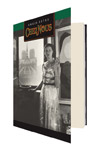Some poetry describes itself so accurately and attractively that reviewing it seems superfluous. Estes’ poetry, for example, offers, and says (correctly) that it offers, an art “not only opulent / but copious, a cornucopia / of opinion which concludes / that opera is work.” “Opera” happens to be the plural of “opus,” so that it means “work” in more than one way, and signals (singingly) one of many plays on words. Very few poets understand language’s singing side, its vocal music, half as well as Estes, and few succeed as she does in making that music control whole poems: one lyric ends by asking “whether you’d rather / remember spending hours // next to the sea, against / the sea, or in ecstasy.”
Estes develops smart ideas about how our lives interpolate delight with grief, about bilingualism, and about how to look at paintings, seasons, wars, clothes. Yet when you open Chez Nous you may not notice those ideas; instead you’ll notice the sounds and the semantic turns, most of them acoustically acrobatic, with leaps and modulations and trills. (“It’s the opposite of / Baroque so I want / none of it,” she says in a poem called “Sans Serif.”) Her poems hold together as speculations and arguments even though they contain passages as self-sufficiently, shiningly gaudy as these: “Lady-in-waiting / lying in wait but never lying // low like the law, that which is / set down” (about Verdi’s Aida); “side by / side like the runners / of a sleigh in snow” (about composers’ handwriting on staff paper). Just as some tribes, and cooks, use all parts of a slain animal, Estes tries to use all the parts of a word—the word “miss,” for example: in John Singer Sargent’s painting Madame X, the (sexually suspect) subject’s “gown is missing / a strap, but not missing it sincerely.”
If Estes knows that poems are made of words, she also understands that good poems have subjects. Most of hers have at least five: subjects in “Kind of Blue,” for instance, include doves, the heat death of the universe, the difference between written and improvised music, Miles Davis, joy, resignation, and “Cecilia Bartoli gargling.” Estes shares her associative structures and her verse lines with the epigrammatic Kay Ryan, with the early (pre-1990) Jorie Graham, perhaps with Alice Fulton, but in this (her third book) she usually sounds like no one else. She makes a particular signature of the bilingual or multi-layered pun—for example, on “vogue” (French for “fashion”) and “vague” (French for “wave”).
If you are allergic to poems in which Americans praise self-conscious beauty, or in which they enjoy European bric-a-brac, Estes isn’t for you, or not without allergy meds—but that’s your problem, not hers. Glamour, Estes implies, shields us against loss; so does our ability to describe. “Elegy” quotes Garbo in Queen Christina: “In the future, / in my memory, I shall live / a great deal in this room.” “Shocking,” a front-runner for any anthology, introduces the designer Schiaparelli and the “hot, / hot pink” which became her signature; imagines “a voyage / to Begonia, country in which to be / and be gone are one”; and then shocks us with Schiaparelli’s Paris circa “summer / of 1939,” from which many things and people would indeed “be gone.” Despite such sad touches, such pity (one vowel away, as another poem says, from “piety”), Estes remains a poet of exuberance, one who can evidence unsettling claims while still having fun with language, and with languages—a kind of fun her technique both expresses and creates, given (as she says) “with a lick/ of gold leaf.”





